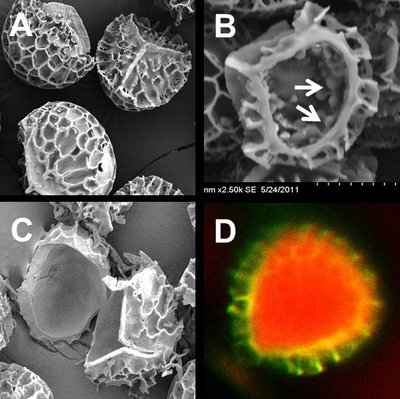Oral vaccine delivery via pollen shells
Any system that makes the delivery of vaccines easier is a boon to world health.
The US Department of Defense is mandated to provide health care anywhere in the world at any time to protect against natural and man-made health threats. However, having trained and equipped medical personnel on hand is not feasible for every mission so the DoD invests in medical treatments that can be easily administered by one’s self or by fellow service members. Among the 2012 class of academic researchers receiving mentorship and funding through the Defense Advanced Research Projects Agency’s Young Faculty Awards (YFA) program, one individual is studying novel methods for packaging and delivery of orally consumed vaccines. His tool of choice: pollen.
Harvinder Gill, an assistant professor of chemical engineering at Texas Tech University, seeks to understand, engineer and test a pollen-based oral vaccination platform to protect against a range of infectious diseases. If successful, his research could lead to more effective, more easily administered and more easily transported vaccines for deployed troops.

What attributes does pollen have that make DoD consider it anything more than a seasonal menace to humans’ sinuses? To start with, the exterior of a pollen grain is a shell made of a naturally durable, non-allergenic polymer. The contents of the shell that actually contain the allergy-inducing plant proteins and fats can be cleaned out, rendering the shell itself neutral. The leftover space inside the shell could be filled with vaccines and delivered into the body through oral ingestion. The pollen shell’s natural toughness would help the vaccine survive conditions inside the body. The pollen could then pass through the intestinal lining to deliver vaccine.
The value of an orally consumed vaccine is that it is efficient, painless, can be self-administered and can induce both systemic and mucosal immune responses, thus enhancing protection. But why is pollen any better for this than a traditional pill? The body’s own processes often limit the effectiveness of pills. When patients ingest vaccines and other medications, stomach acids and digestive processes can degrade the medication. Because pollen shells are durable, however, they can potentially survive inside the body and safeguard a vaccine until it can be delivered. All this means that along with the traditional image of pollen as airborne particles that cause headaches and sneezing, pollen could also eventually be known as an edible vaccine delivery vehicle.
Droplet microfluidics for single-cell analysis
Discover how droplet microfluidics is revolutionising single-cell analysis and selection in...
PCR alternative offers diagnostic testing in a handheld device
Researchers have developed a diagnostic platform that uses similar techniques to PCR, but within...
Urine test enables non-invasive bladder cancer detection
Researchers have developed a streamlined and simplified DNA-based urine test to improve early...




